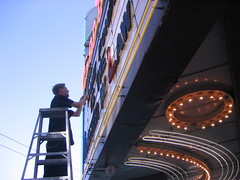
Changing the Marquee
Originally uploaded by Luke and Sarah.
Tuesday evening, Sarah and I were privileged to join about 400 other filmgoers for a special screening of this year's Oscar-winning documentary, Born Into Brothels. Special because the filmmakers, Zana Briski and Ross Kauffman, were on hand to answer questions following the film as a part of the Seattle International Film Festival.
The film tells the story of Briski, a photographer, and 8 children who are growing up in the red light district of Calcutta. Briski went to India in 1995 to document women' issues there. Through her connections there, she was led to get a room in one of the brothels to earn the trust of the women. While she was there, the children of these women became fascinated with her camera. Upon her return visits, Briski began to teach the kids how to take pictures on their own.
The opening sequence of the film cuts between scenes from life in the red light district and close-ups of the children's eyes. It is a brilliant way to open our eyes to what the children have experienced their entire lives, as well as telling us that our perspective will be from the kids point of view. The film starts as the kids are getting their first lessons in photography. Briski teaches the children about framing and composition, but encourages them to have their own style. She is also subtly teaching the audience to look beyond what's simply in the foreground as what matters.
As her students start to show talent, she realizes that all her work will be in vain if they are unable to leave the brothel and need to attend boarding schools. One child in particular shows great potential to pursue his art, but he concedes that "there is nothing called 'hope' in my future." In the end each child's story plays out in different ways: some uplifting and hopeful, others heartbreaking.
The interview with Briski and Kauffman after the film helped to build the story even further. They had intended to show some updated footage of the kids filmed this January but were unable to due to technical issues at the theater. They did tell about the current situations for the kids; some of them are on the road to high school.
In regards to the making of the film, Kauffman reflected on the difficulty of having Briski as the protagonist when the kids were really the main characters. Kauffman is currently a writer in Hollywood but worked as editor for 10 years on his way up in the industry. He plays just as much a role in the making of this film because he was able to nail down a narrative thread while Briski was just getting as much footage as she could get.
They also talked about the organization that has grown out of this experience, Kids With Cameras, which has started teaching children in Haiti, Cairo, and Jerusalem. When asked if their work seems hopeless in light of eight million homeless children in Brazil alone, Briski answer "suffering is endless. (The organization) is about individuals and empowering underprivileged kids." Another audience member asked about what good it was to teach these kids photography, when only a few of them will ever be able to leave the streets on the merits of their art. Kauffman replied that "the kids get to look at their won lives in a different way... and they learn to express themselves."
Briski and Kauffman made it obvious that they did not set out to change the world, but they are starting to make progress in some nearly untouchable areas. They clearly see the dignity that we all holds as human beings. If these kids are able to understand that their lives are worth living, no matter the suffering involved, then they are able to see the beauty that is all around them and attempt to share that joy with those around them.
Kauffman told about showing the film to kids this past January. The kids felt that it was a very good representation of that time in their lives. One girl in particular, who started out as the quiet one, had become more talkative in the end. Upon watching the film, she said that it was incredible to see how she acted back then and how much her new perspective has changed her outlook on life. Born Into Brothels caused me to look in a new way at the need for mercy and how tangibly it can be brought with such an incredible impact.
* For more reviews, check these out:
At Looking Closer by J. Robert Parks'
At Decent Films
Roger Ebert
1 comment:
Hey,
Odd how I came across your blog. I was searching for random things on technorati.com, and I happened to come by your blog when I searched for "Aaron Otheim" -_ a friend of mine. But what caused me to leave a comment was your post about Born Into Brothels. I enjoyed your commentary -- I saw it too when it was at the Lynwood Theatre on Bainbridge Island. Do you know what eventually happened to the kids? I wasn't able to stick around to talk to the filmmakers.
Post a Comment